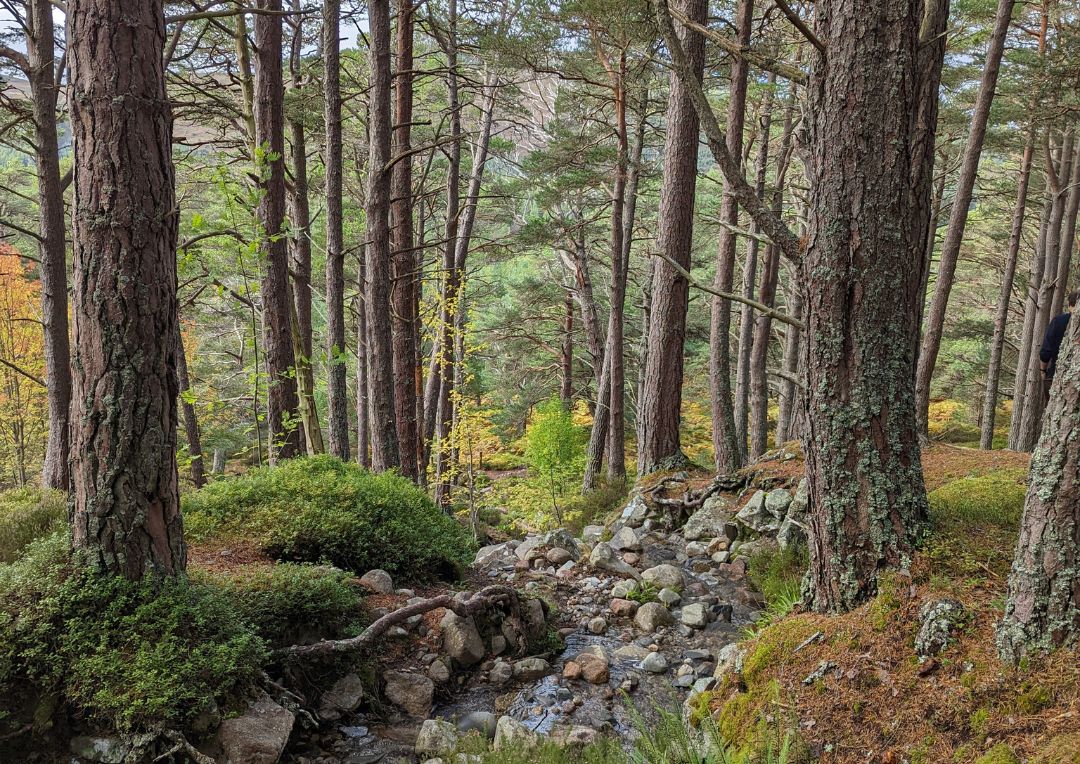Scotland’s natural beauty, fascinating history and lively cities make it a popular travel destination. The downside? Overtourism at popular attractions is rife, threatening the well-being of both local communities and the environment.
The good news is it’s possible to enjoy Scotland and still have a positive impact as a visitor. The answer is responsible tourism and sustainable travel in Scotland.
So, from activities to accommodation, we’ve compiled a quick guide to sustainable travel in Scotland to help you plan a responsible trip.
How to get around Scotland sustainably
Here are some top tips to help you be a sustainable traveller in Scotland:
Use public transport
Most of Scotland’s main attractions are pretty well connected by public transport. The train line is served by ScotRail which can take you as far north as Thurso, all the way down to the Scottish Borders and everywhere in between.
Train travel in Scotland is a real joy to experience as the country is home to some of the most beautiful rail journeys in the world. One of which is the West Highland Line which travels from Glasgow to the West Coast either at Mallaig or down to Oban.
You’re treated to epic scenery on your journey, with highlights such as Loch Lomond, Rannoch Moor and Glenfinnan Viaduct to look out for.
It’s also possible to travel around Scotland by bus and coach. Megabus can take you to most major towns and cities. CityLink Scotland is another popular choice.
If you have plans to explore the Scottish isles there’s no need to book flights. They’re easy and affordable to reach with the Caledonian MacBrayne ferries.
Explore by bike
Get some exercise and fresh air with Scotland’s National Cycle Network. There are some beautiful routes all over the country.
How about beach hopping through the Outer Hebrides island chain? Or why not cycle from Edinburgh city centre to Shore in Leith?
You can, of course, hire push bikes but if you need a little more kick, an electric bike can make all the difference on those hills.
Related read: Some of the Best UK Cycle Routes
Drive an electric vehicle
If you prefer to have your own car or campervan, try to hire an electric or hybrid vehicle where possible – particularly if you’re doing a road trip.
They emit fewer greenhouse gas emissions and air pollutants into the atmosphere so by going electric you’re helping to keep Scotland’s environment clean.
Use ChargePlace Scotland to find electric charging points on your route.
How to choose eco-friendly accommodation in Scotland
Take these steps to find sustainable places to stay in Scotland:
Look for eco credentials
Hotels that are serious about their environmental impact will highlight their eco credentials on their website.
To help inform your choice, look out for third-party accreditations from Green Key, EcoLabel, Green Tourism and Tourism Declares to name a few.
Search on hotel booking sites
It’s never been easier to find sustainable hotels on popular booking platforms such as Booking.com. Look for the ‘Travel Sustainably’ tag.
However, if you’re not too convinced, accommodation booking platforms dedicated solely to sustainability are here to help. Check out EcoHotels.com which only lists certified green hotels.
Ecobnb is another excellent choice as it offers a range of accommodation types that adhere to strict sustainability criteria.
Go boutique and family-owned
Never mind the big chain hotels, one of the best ways to enjoy the local culture and be more sustainable is to stay in independent B&Bs.
Where else are you going to find unique accommodation, get local knowledge, and support small businesses all with a mouthwatering breakfast to match?
Related read: A Guide to Renting a Holiday Home
Some absolutely incredible lodges, B&Bs and hotels include:

Sustainable travel in Scotland: Things to do
From wildlife spotting to rewilding, here are some sustainable activities to do in Scotland:
Go off the beaten track
Avoid crowded hotspots by going off the beaten track on your trip to Scotland.
For example, instead of making a beeline for the Isle of Skye, visit some of the lesser-known islands on the West Coast instead. Skye belongs to the Inner Hebrides group, of which there are 35 inhabited islands!
Glen Coe is another destination that’s particularly susceptible to crowds. This picturesque glen is a hotspot for traffic, drones and litter. For cleaner and more ‘undisturbed’ beauty, why not head to Glen Affric or Glen Lyon instead?
If you do want to swing by Skye and Glen Coe, visit in the shoulder or off-season when there are fewer crowds. Generally, October through to April is much quieter while July and August are the busiest months.
Do a small group or self-guided tour
Take the stress out of your itinerary by doing a tour with a responsible operator. If you want to ensure your impact is positive but still have flexibility, Byway Travel does bespoke no-fly itineraries.
With Byway, you can easily create a personalised self-guided itinerary that takes you through the Scottish Highlands and islands.
Solo travellers might prefer small group tours led by local guides that help you connect with the local culture and environment.
A great example is Intrepid Travel. It has a selection of multi-day itineraries which focus on hiking holidays, island-hopping or exploring the best of Scotland in just over a week.
Byway and Intrepid Travel are B Corporation certified which means they meet high social and environmental standards.
Related read: Road Trip Through the Scottish Highlands
Learn about conservation
Scotland is renowned for its natural beauty, but truthfully, its landscape is heavily nature-depleted. The Scottish Highlands alone were once home to the Caledonian Forest which covered a vast area of land. Now just 1% of it remains.
One of the most impactful ways to be a sustainable traveller in Scotland is to learn about Scottish rewilding and conservation.
SCOTLAND: The Big Picture is a rewilding charity that runs rewilding education trips in the Cairngorms National park.
It offers a jam-packed itinerary featuring guided nature walks through Glen Feshie, and nature-friendly farms, and hosts discussions on biodiversity and wildlife reintroduction.
These tours are perfect for nature lovers and wildlife enthusiasts who want to get a deeper understanding of Scotland’s natural environment.

Do a tree-planting weekend
Another way you can have a positive impact on Scotland is to help restore its depleted forests by planting trees or supporting tree-planting initiatives.
Trees for Life is on a mission to rewild the Scottish Highlands. You can visit a number of sites the charity works on and enjoy the natural surroundings.
Another way to get involved is to volunteer at Dundreggan Rewilding Centre (opening in 2023), where you can help tend to young trees in the nursery and join rewilding projects. You can also visit the centre and learn more about rewilding.
Go hiking in the Highlands and Lowlands
Scotland benefits from a ‘right to roam’ law which means the public is allowed to access most land and inland water for non-motorised recreational uses – as long as they’re responsible.
So, what better way to make the most of this access than by hiking?
There’s no end to beautiful hiking trails all over the Scottish countryside. Some of the best one-day walking trails in Scotland include:
- Arthur’s Seat, Edinburgh
- Conic Hill, Loch Lomond & the Trossachs
- Rackwick to the Old Man of Hoy, Orkney
- Ben Nevis, Fort William
Multi-day hikes in Scotland include:
- West Highland Way
- Great Glen Way
- Borders Abbeys Way
- The Speyside Way
- Berwickshire Coastal Path
Be a sustainable hiker in Scotland by ensuring that you leave no trace. Stick to the path, take all rubbish home with you and leave everything as you found it.
Stay safe out there too. Pack the appropriate gear and keep an eye on the weather forecast.
Related read: The Best Sunglasses for Hiking & Outdoor Activities
Cycle around Skye and other islands
While Skye suffers from an overtourism problem, it’s possible to explore the island with a lighter footprint.
To start with, swap the car for a bike. Next, visit on the shoulder or off-season to reduce the amount of congestion on the roads.
Many of the island’s attractions can be found on the Trotternish Loop, a popular mini-road trip around the Trotternish peninsula. A cleaner and greener way is to cycle it instead.
Skye EBikes allows you to rent e-bikes at an affordable rate and follow the well-marked loop to sights such as the Quiraing, Old Man of Storr, Fairy Glen, Kilt Rock and more.
Cycling is a mode of transport you can use throughout the Scottish isles rather than driving.
You can hire e-bikes on the Isle of Mull or bring your own bike and cycle some of the epic long and short routes across Orkney, Shetland, Outer Hebrides and more!
Go wildlife spotting
One of our favourite places to go wildlife spotting in Scotland is in the Treshnish Isles, an archipelago of small islands and skerries off the coast of Mull.
Birds and marine life are in abundance here and you can meet them in their natural habitat on an ethical boat trip.
Staffa Tours runs boat tours departing from Tobermory and Fionnphort on Mull as well as Oban and Ardnamurchan on the mainland.
Its various routes take you to Iona (the birthplace of Celtic Christianity) and Staffa, an island inhabited by puffins from April to August.
Look out for minke whales, dolphins, grey seals, cormorants, gannets, guillemots and more. You might even see basking sharks if you’re lucky!
Always make sure to keep a respectful distance from any wildlife you encounter. Don’t try to touch, stroke or feed them either.

Support small and sustainable businesses
An easy way to advocate for sustainable tourism in Scotland is to support local businesses.
Shopping small helps to keep money in local communities. You also get a deeper understanding of the local people and culture. It’s a win-win!
Take it a step further by supporting businesses that make an effort to be greener too. For example, Dawyck Botanic Garden in Peebles is the UK’s first carbon-neutral botanic garden.
Inverary Castle, owned by Argyll Estates is a Green Tourism Silver award-winner thanks to its biomass heating system, biodiverse grounds, waste minimisation and local shop.
If you enjoy a tipple, Eden Mill Distillery in St Andrew’s is Scotland’s first carbon-neutral distillery. Pop into the shop to get a bottle of gin or Scotch whisky.
For tours and tastings, head to Nc’Nean, an organic distillery and certified B Corporation on the Morven peninsula.
Final thoughts on sustainable travel in Scotland
We hope you found these tips useful in planning your own eco escape in Scotland.
While its environmental health is far from perfect, it’s still one of the ‘greenest’ countries in the world.
Great cycling and public transport routes offer accessible alternatives to cars. Plus there are plenty of eco-friendly activities and places to stay.
Ultimately, travelling sustainably in Scotland is about finding a balance, whether that’s mitigating your own footprint, supporting green businesses or avoiding overtourism hotspots.



